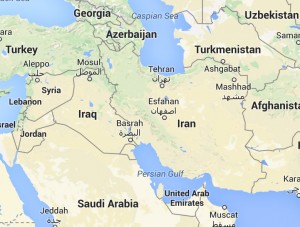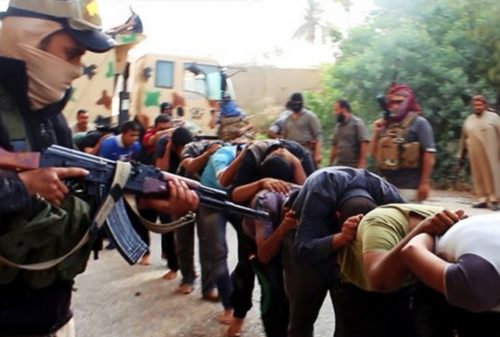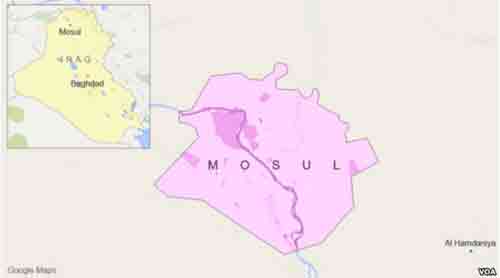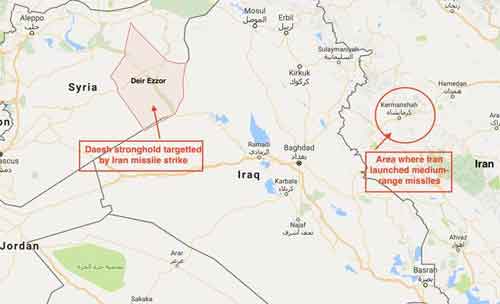
Just five years ago, the United States was involved in nearly every aspect of Iraq’s life, from economic reconstruction to political development to military cooperation. Now, analysts say, regional power broker Iran dominates the Iraqi landscape.
On the battlefield, Iran is helping Iraq push out Sunni-dominated Islamic State extremists from key northern cities. Trade between Iraq and Iran flows easily over the border. And Tehran has permeated deeply into Baghdad’s security and intelligence structures.
Maria Fantappie, senior Iraq analyst for the International Crisis Group, says Iran’s strong sway over the Iraqi Shi’ite militias, and their likely leadership role in re-establishing basic services such as electricity and water as Islamic State militants retreat, risks weakening the Iraqi government’s already fragile control over its own territory.
But Iran’s influence, Fantappie says, stretches much further than that: it is changing the very character of the Iraqi nation and as a result, the power dynamics in the region.
.
“It’s enough to have a tour of the streets of Baghdad, to see pictures of the [Iranian] Supreme Leader Khameini posted everywhere, and often now the Iraqi national flag is often showed besides another flag which is that one of Hussein, which is a reference to the Shia identity. Although this does not refer strictly to Iran, it is a direct consequence of Iran’s peaking role within Iraqi politics,” she said.
Western allies and Iran, who are in prolonged negotiations over Tehran’s nuclear program, appear to have found common ground in fighting Islamic State militants in Iraq, says Henry Smith, senior consultant for Control Risks in the Middle East. The U.S. and its coalition partners are assisting Iraqi ground forces with airstrikes in its battles against the Islamic State, while Iran is providing supplies, arms, ammunition and aircraft and leadership.
“In the period in which Iran has been negotiating over its nuclear program with the P5+1, you have also had a growing implicit acceptance of the fact that Iran [has] a key role in some of the key security issues in the Middle East,” said Smith.
But videos have emerged of the government-backed Shi’ite militias committing atrocities in Sunni communities. Islamic State militants have capitalized on Sunni anger with the sectarian policies of successive Baghdad governments.
University of Maryland researcher Phillip Smyth warns that Iran’s ever-stronger presence will exacerbate Iraq’s Sunni-Shi’ite sectarian divide and make it harder to form an effective inclusive government.
“Many of these groups are going into Sunni areas and putting power drills through people’s heads,” said Smyth. “They are a highly sectarian organization, so you can’t really deny that they are actually part of the cause for the crisis we are facing now.”
But Henry Smith of Control Risks, says Tehran wants a stable Iraq where it can extend its sphere of influence.
“There is a bit of a balance there,” he said. “Iran wants to have a government in Baghdad which is compliant and in line with Iran’s strategic thinking, both in Iraq and the broader region, but it also doesn’t want a country that is essentially slipping out of control.”
For American policy makers, there is no clear solution. They are faced at home with a nation tired of war and endless years of expensive reconstruction, and a choice between Iran or the Islamic State gaining strategic ground in Iraq.
But as U.S. policy makers wait, Fantappie says, Iran is taking over Iraq’s own security structure.
“It’s a wait and see attitude. It’s a wish of not involving into the restructuring of the state, but it’s also in a way a complete detachment from the full erosion of a state,” she said.
With Iraq’s weak government and tenuous control over tens of thousands of armed Shi’ite militia fighters, Iran will likely continue to play a crucial role in the country’s security. The question remains as to whether Tehran will turn out to be a long-term stabilizing influence or a potential source of even greater instability.






